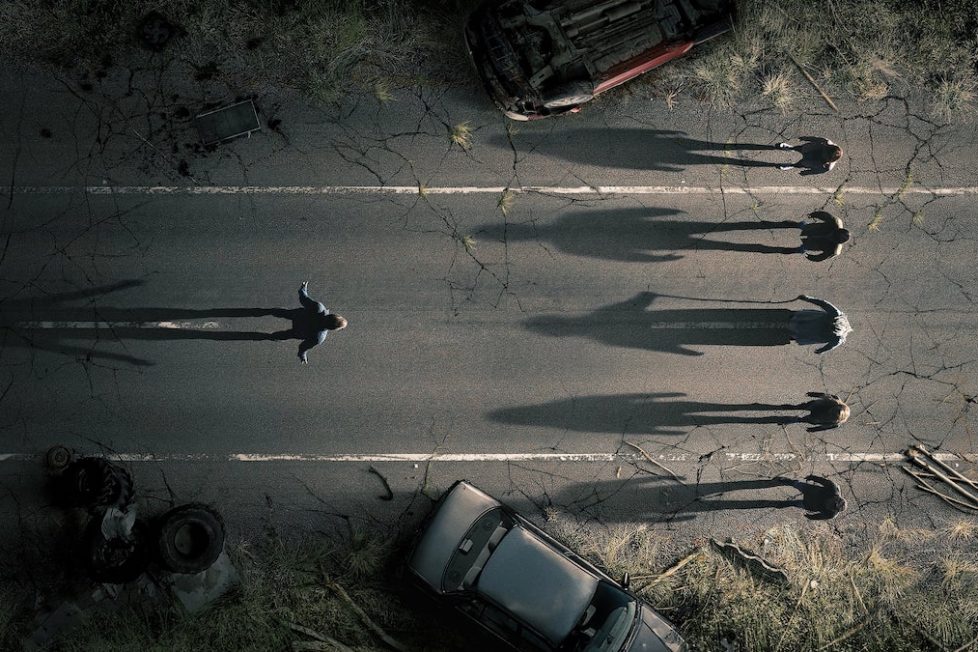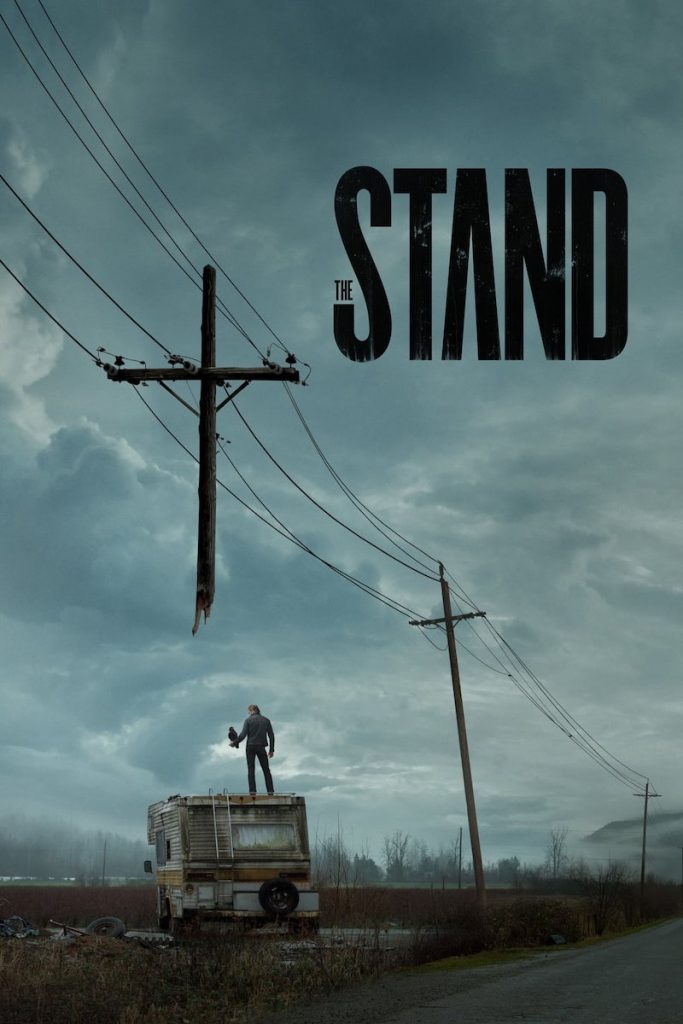THE STAND (Paramount+, 2020)
After a man-made plague leaves the world in ruins, a battle of Biblical proportions ensues between the survivors.

After a man-made plague leaves the world in ruins, a battle of Biblical proportions ensues between the survivors.


Stephen King’s The Stand, published in 1978, is one of the acclaimed author’s best-known works. It’s also his longest novel, spanning 823 pages (increased to 1,308 for the ‘Complete & Uncut Edition’ in 1990), and is often featured in many respected publication’s lists of all-time greatest works of fiction.
Too unwieldy for a single movie, a miniseries was first made by ABC in 1994, with Mick Garris (Sleepwalkers) directing all four of its Emmy-winning episodes. But for all its acclaim and success at the time, the ’90s version hasn’t aged too well in some respects, and even a total of six hours meant shortcuts had to be taken. And that’s before you factor in how modern TV’s now able to match the spectacle of a big-budget movie depiction. It was only a matter of time before another studio took a second crack at adapting The Stand, so after a number of years in development, it finally arrived exclusive to CBS All Access (since rebranded Paramount+).
Considering the trepidation its reputation can cause, The Stand is really a simple story at heart. It’s an old-fashioned battle between Good and Evil, with folk amassing on either side of some mountains following a devastating plague that kills most of the world’s population. What creates anxiety when it comes to adaptation The Stand is the sheer number of characters, and how most have an arc it would take hours to tell faithfully. So it’s always been a case of picking your focal points, choosing your highlights, finding a clear narrative path that works over the time you have, prioritising characters who matter the most, and not getting distracted by a fanboy desire to bring everything to the screen. But like all book adaptations, you’ll never find a way to capture the thoughts of this ensemble, unless you make the mistake of giving everyone internal narration.
The first batch of The Stand’s nine episodes are the most problematic, as lead writers and developers Josh Boone (The New Mutants) and Benjamin Cavell (Justified) decided to wrestle the story into shape quicker using flashbacks. So while we sometimes spend time with folk dealing with the the immediate effects of the ‘Captain Trips’ flu as it spreads across the globe, the show often jumps ahead many months later to when characters are now part of groups trying to build new lives.
It sounds simple enough on paper, but the execution should have been better. Whenever a time-jump occurs, it’s rarely signposted well, so there are times when one feels confused about when things are happening, or how far ahead of the flashbacks the present-day stuff is taking place. It would’ve been useful to flag the changes with a difference in colour-grading, or a few physical changes to the characters themselves, but there’s not much done to make it clear. A quick glance away from the screen, or an un-paused snack break, and you may be suddenly lost and confused. It feels like the writers assumed everyone would grasp what they’re doing because their audience are primarily going to be book-readers, but for newcomers I’m sure it was vexing at times.
Nevertheless, we’re introduced to most of the key players by the fourth episode: geeky loser Harold Lauder (Owen Teague), who holds a candle for his former babysitter Frannie Goldsmith (Odessa Young) and uses the apocalypse as a chance for him to be with her romantically, now he’s almost “the last man alive”; Stu Redman (James Marsden), who finds himself in a military bunker being studied for his viral immunity, before escaping and hooking up with Frannie and Harold, to the latter’s chagrin; New York musician Larry Underwood (Jovan Adepo), who flees the dangerous city through the sewers with a woman (Heather Graham) he meets in a park; criminal Lloyd Henreid (Nat Wolff) who’s left to die in prison for robbing a convenience store after the guards and inmates succumb to the contagion; a woman into the occult called Nadine (Amber Heard) and her son Joe (Gordon Comier); deaf-mute temp worker Nick Andros (Henry Zaga), who meets a sweet-natured illiterate man with learning difficulties called Tom Cullen (Brad William Henke); and sociology professor Glen Bateman (Greg Kinnear).
The excellent casting of The Stand is certainly a strong suit. I particularly enjoyed Owen Teague’s performance as an unpublished young writer who snaps when his end-of-the-world fantasy falls apart, once a more masculine and handsome love rival shows up. Harold has always felt analogous to Stephen King himself, so Teague’s facial resemblance to the author didn’t go unnoticed either. Someone sign him up for the inevitable King biopic! The writers seem to enjoy writing Harold’s arc the most, as it dominates the earlier episodes in particular, while characters like Nadine and Glen don’t get much of a look-in.
Brad William Henke is also wonderful as Tom, perfectly portraying a man with learning difficulties without straying into distasteful parody. A shame the same can’t be said of Ezra Miller (Justice League), who enters the story near the end for an outrageous appearance as fan-favourite ‘Trashcan Man’, seemingly convinced that screeching and pulling faces is an acceptable way to play a mentally-disturbed villain. The other actors are all generally decent, but no stretch for reliable actors like Marsden and Kinnear in particular.
As the two figureheads of Good and Evil in The Stand, it’s also a relief that Mother Abigail and Randall Flagg are represented well. Whoopi Goldberg wanted to play the benevolent spiritual leader of Boulder when the ’90s miniseries was being developed, but she was considered too young at the time. Now in her mid-sixties, Goldberg brings a soul and dignity to Mother Abigail that works extremely well. It’s a shame the story doesn’t give her much to do, in truth, but it at least avoids too much of the ‘magical negro’ criticism King himself admitted to.
Alexander Skarsgård is also enjoyable as Flagg, making the Skarsgård’s something of a go-to for King-created villains after his younger brother Bill portrayed Pennywise in the recent It (2017) duology. This role isn’t a stretch for Skarsgård, who effectively reprises vampire Eric Northman from True Blood (2008-2014), but he’s entertaining and believably demonic without it being gross and charmless.
Blessed with a talented ensemble and a good-sized budget, which could even afford VFX courtesy of ILM to ensure its vision of an apocalyptic world is vivid, the sad truth of the matter is that The Stand doesn’t work because of its writing. This adaptation captures almost every major event of the story, and some of its changes are improvements, but nine episodes just isn’t enough. It’s a few hours longer than the ABC miniseries, sure, but in the age of The Walking Dead and other serialised TV epics, audiences have come to expect a depth that comes from spending far longer with a cast to better get to know them.
A few characters are given enough time for their arcs to land emotionally, most notably Harold Lauder, but too many just aren’t. So by the time the story’s moving towards the big climax in Las Vegas, you realise you don’t care about some of the folk involved. Or you sometimes sympathise more with the ones you shouldn’t, because at least you’ve been given enough time to grasp their twisted perspective and logic. And I don’t mind admitting that one character involved in final confrontation with Flagg and his acolytes, Ray Brentner (Irene Bedard), had barely even registered with me as a presence on the show.
Of course, you can only work with what you’re given. I’m sure Boone and Cavell would have loved to oversee a multiple-season version of The Stand, with enough time to give each of the main characters complete backstories and properly developed arcs. Having more episodes might even have resulted in a need to embellish the core story, perhaps with the help of King himself, to make this version surprising for those who’ve read it before. Throughout this version, I was constantly wondering why so many characters roll with all the supernatural events happening around them and don’t question it seriously. It never once felt believable that these people had not only suffered a near-extinction event, but were also now caught up in a theological battle between Heaven and Hell.
The Stand is over 40 years old now and its influence on subsequent supernatural and apocalyptic tales can’t be overstated, so that does mean newcomers may find some of this rather pedestrian or predictable. It’s the age-old problem of trailblazers seeming old-fashioned to those unaware of the lineage. I must confess the ending of The Stand feels too easy and disappointing after such a long build-up over Flagg’s abilities and scheming, which is perhaps why this version wanted to include a coda written by King himself to tie things up more intimately. And it’s noticeable how much more involving and tense the new ending is, despite being smaller in scale and little more than an amusing grace note. King’s a more experienced writer than he was in the late-1970s when he wrote The Stand, or even the early-1990s (when he last “updated” the story), so part of me would have loved to have him write every episode of this miniseries. He clearly understands these characters better than anyone else working on the show, as the last episode was the first time I felt particularly connected to Frannie after eight episodes!
Ultimately, The Stand feels like a missed opportunity by people who clearly love the source material. The fact we’re living through a real-life coronavirus pandemic when this aired gave it added topicality, although many will also have found it tough to find entertainment in a story about an apocalyptic plague. But I was struck by moments when the cult of Flagg evoked that of far-right Republicans rallying around President Donald Trump, despite his clear wrongdoings, as they’ve likewise been sold freedom to indulge their worst instincts through lies and deceit. Trump and Flagg even thrive on power given to them by people’s unquestioning adulteration at mass rallies. This speaks more to the prophetic nature of King’s novel than to anything the miniseries discovers for itself, but it’s a welcome way for The Stand to feel more relevant today.
If you enjoyed reading this article, please support my writing by buying me a coffee.
USA | 2020 | 510 MINUTES • 9 EPISODES | COLOUR | ENGLISH

writers: Josh Boone, Benjamin Cavell, Jill Killington, Owen King, Eric Dickinson, Knata Lee, Taylor Elmore & Stephen King (based on the novel by Stephen King).
directors: Josh Boone, Tucker Gates, Danielle Krudy, Bridget Savage Cole, Chris Fisher & Vincenzo Natali.
starring: James Marsden, Odessa Young, Owen Teague, Alexander Skarsgård, Whoopi Goldberg, Amber Heard, Jovan Adepo, Henry Zaga, Nat Wolff, Irene Bedard, Brad William Henke, Greg Kinnear, Ezra Miller, Fiona Dourif, Heather Graham, Clifton Collins Jr. & J.K Simmons.
